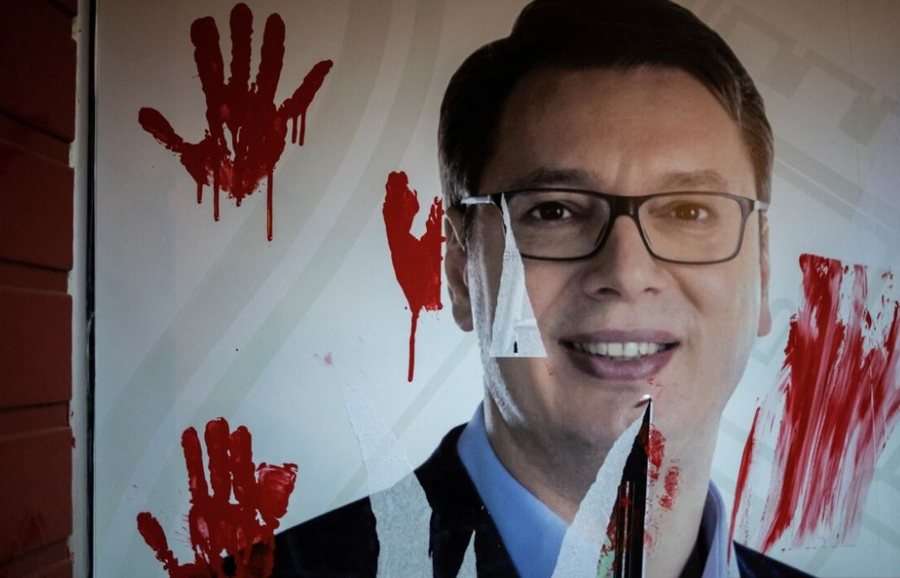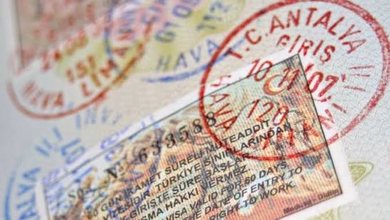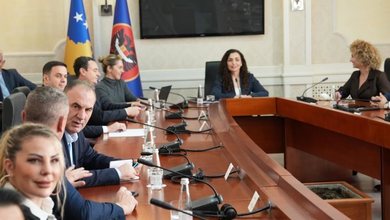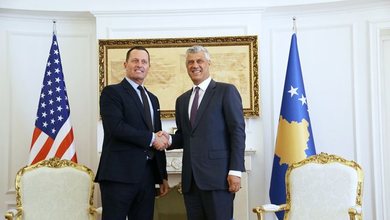
Early elections, this is the demand of thousands of anti-government protesters demonstrating in the streets of Serbia. The government leaves room for early elections, but refuses to announce them.
This is the political landscape of Serbia, one year after the start of the most massive protests in its recent history.
Historian Dragan Popovic describes the atmosphere as a "referendum".
On one side is the government, embodied in populist leader Aleksandar Vučić, while opposite him are anti-government forces, led by the student protest movement.
Tensions have increased, and the government, as Popović points out, has responded to the protests with repression against the protesters.
"The image of Serbia today is the image of a destroyed society, of destroyed institutions and of a ruined political system," he told Radio Free Europe (REL).
The European Parliament also describes the series as a "polarized society."
In an EP resolution, Serbia's state leadership is considered responsible for escalating repression, normalizing violence and weakening democratic institutions.
Citizens, led by students, do not give up on protests.
"Political action is no longer a matter for the political elite, but for all people. I have the impression that the protests have become popular, that people want to identify with the movement," Isidora Majkić, a student at the Faculty of Mathematics in Belgrade, told Radio Free Europe.
"A serious blow to the regime"
After a year of protests, the political scene remains unclear.
Apart from the date of the elections, it is not known who will participate in them, nor is the result predictable – unlike some previous election cycles.
Serbian President Aleksandar Vučić, his Serbian Progressive Party (SNS) and his allies have ruled the country for 13 years.
While Vučić and the SNS have consolidated power, Serbia, according to assessments by international organizations, has fallen in rankings that measure the situation of human rights, freedoms, and the level of corruption.
It is precisely the accusations of systemic corruption that are at the center of the protests, which erupted after the collapse of a concrete shelter at the Novi Sad Railway Station on November 1, 2024, where 16 people lost their lives and one was seriously injured.
“This has been a blow to the regime from which it is unlikely to recover – it remains to be seen how long the fallout will last,” says Popovic.
He describes Vučić as "an authoritarian leader who stifles democratic processes."
The international organization Freedom House gives somewhat more lenient assessments, but lists Serbia among the partly free countries.
According to this organization's index, Serbia in 2025 has marked the greatest decline of all European countries in terms of freedoms.
The Presidency, the Government of Serbia, and the SNS have not responded to REL's questions regarding the early elections and the accusations of repression and the destruction of democracy.
"Protest demands are met with a dropper"
These are not the first protests to shake Vučić's regime.
But, they are the largest and longest-lasting so far.
"I wouldn't say that the roof collapse was the tipping point, but we got involved at the moment when we felt we were able to act directly," says student Anja Despotović, who studies at the Faculty of Electrical Engineering in Belgrade.
Waves of student blockades began at the Faculty of Dramatic Arts, where students and professors were attacked while honoring the victims of the Novi Sad tragedy.
The protest spread like an avalanche to almost all public universities in Serbia.
From the blocked faculties, students took to the streets, where they joined disgruntled citizens.
They filed requests for the publication of documents that would shed light on the causes of the accident and the possibility that the event was related to corruption.
The reconstruction of the railway station was part of a key state project – the high-speed railway from Belgrade to the border with Hungary, where Chinese companies played a leading role.
The students refused to address Serbian President Vučić, saying he was "not competent."
"We tried not to fall into the narratives of other politicians, because we are not politicians," emphasizes Anja Despotović.
Vučić, however, responded.
At the beginning of the year, he claimed that the requirements had been met, inviting students to return to class.
The students responded that their demands had not been met.
"They filled them with droppers, as much as was convenient and as much as was not dangerous. It was a show for the public," says Anja Despotović.
"We as a movement at one point matured politically to say we will not fulfill the demands. Because we cannot fulfill them and remain in power at the same time," adds Isidora Majkić.
Since May, in addition to demanding criminal responsibility for the accident that sparked the protests, demonstrators have also been demanding political responsibility: resignation and the announcement of elections.
"Vučić, go away" has become one of the most common slogans on the streets.
Meanwhile, Vucic calls the demonstrators "blockers", emphasizing that "the road will not govern Serbia".
Spontaneous gatherings of citizens, without party symbols, have appeared on the streets, calling for protests in local communities.
From February to the end of September 2025 alone, more than 10,700 rallies were held in over 630 settlements in Serbia. /REL/






















